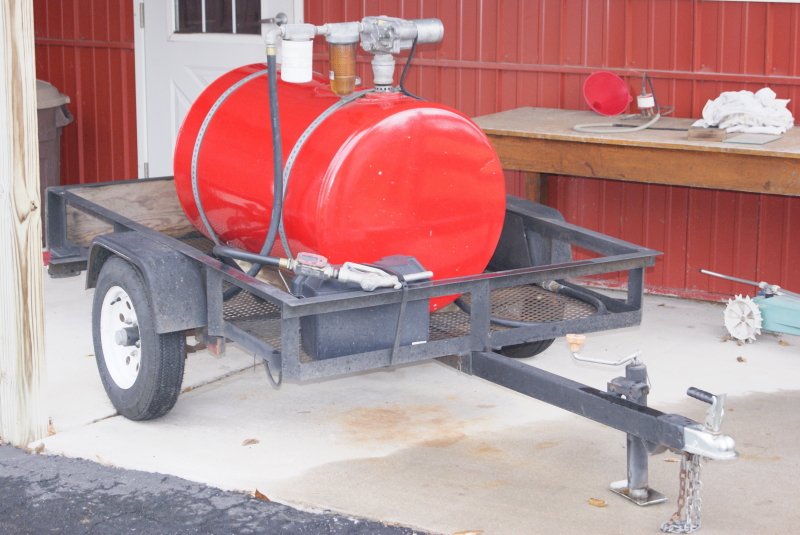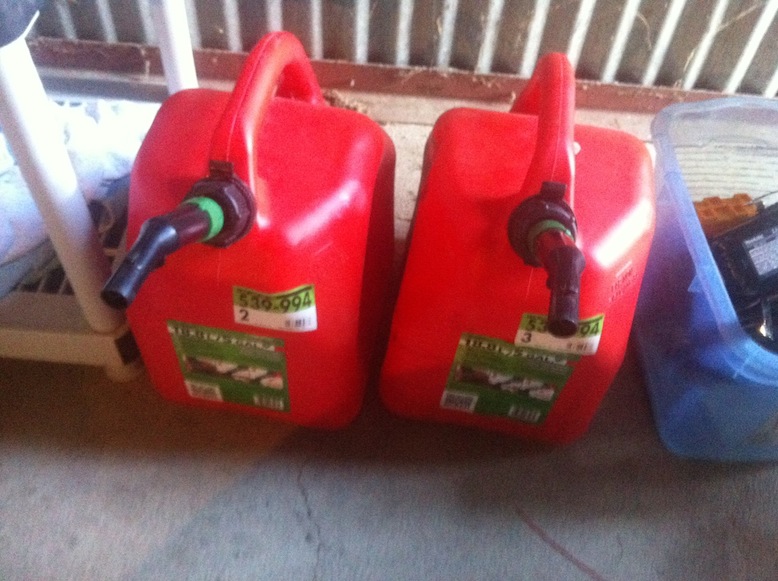Geico266
Touchdown! Greaser!
Is that a gasoline rated rig or Diesel?
Aluminum diesel saddle tank.
I welded a new port to allow for the fuel pump.
Last edited:
Is that a gasoline rated rig or Diesel?
Just remember, those farm store pumps are not gasoline rated, only Diesel and kero type distillates.
Negitory big guy. They are fuel rated.. Diesel, gas, kerosene.
I'm pretty sure it's 119 gallons max in Missouri. Anything over requires a DOT approved trailer/tank, etc.
Of course, it doesn't matter if you never have an accident or spill but...if you ever do...then your estate will be going to the feds.
I burn mogas, but life's too short to take unwise risks.
Different state have different laws, including intrastate procedures. If you go across a state line, you will be subject to federal rules. My understanding is the feds will require that a container used to transport gasoline must be built to and labelled as meeting DOT standards, no matter the size. Not the same for diesel. Over 119 gallons, the feds say you have a petroleum cargo vehicle. Placarding is required. A CDL with hazmat may be required. Many times, a farmer or small businessman who only works intrastate ignores these requirements and takes their chances. Whether that is a good idea is subject to discussion.
Is an IBC a good gasoline container?
"9. Can I store petroleum products in your tanks?
We do not recommend storing petroleum products in our tanks because they will permeate (soften) the tank walls. Contact Snyder with your specific application. You will find that aromatic hydrocarbons and halogenated hydrocarbons will not be recommended for polyethylene."
Can you get a DC pump at Farm & Fleet, etc.? Yes. Many of them are rated for diesel or other fluid but specifically exclude use with gasoline. The ones rated for gasoline will start at $200 or so and go on up.
Does your auto insurance allow you to transport gasoline in the quantities you envision?
I use totes for agricultural chemicals and would not use them for transporting gasoline over a public road. Too much risk of puncture and catastrophic fire in even a minor accident.
Check into your laws about truck versus trailer petroleum containers as they may be different.
As an aside, depending on where you fill up, some jobbers or distributors may have requirements for grounding, placarding and safety equipment imposed by law or their insurance policy.
 We are trying to keep GA viable, and less expensive. Saving $1.30 a gallon is a good place to start.
We are trying to keep GA viable, and less expensive. Saving $1.30 a gallon is a good place to start.Negitory big guy. They are fuel rated.. Diesel, gas, kerosene.
http://www.tractorsupply.com/gpi-reg-m-150s-em-fuel-pump-1-5-hp-1-in-inlet-3958105
Nice, yeah, that's the $260 one, I can rig an air compressor powered diaphragm pump with compressor for less and have a compressor to boot.
Negitory big guy. They are fuel rated.. Diesel, gas, kerosene.
http://www.tractorsupply.com/gpi-reg-m-150s-em-fuel-pump-1-5-hp-1-in-inlet-3958105
Many of the regulations you quote simply do not apply if the fuel is used locally for personal use. If you don't want to build a fuel trailer don't, but please don't cite non applicable worthless regulations to scare others away.We are trying to keep GA viable, and less expensive. Saving $1.30 a gallon is a good place to start.
I've been using my fuel trailer for 15 years, pumped over 8,000 gallons and saved around $10,000.
Oh, and if it were illegal why do they make commercial fuel trailers meeting DOT specs??
http://www.qualityfueltrailers.com/fuel-trailer-types/aviation-fuel-trailers
You need to see what the local state laws are and if you go across state lines you need to address federal laws. This is not hard to do. Otherwise, one does not know if one is illegal or not.

...
Oh, and if it were illegal why do they make commercial fuel trailers meeting DOT specs??
http://www.qualityfueltrailers.com/fuel-trailer-types/aviation-fuel-trailers
I would caution the OP against using any plastic type tank to haul a large quantity of gasoline due to the possibility of static electricity generation as the fuel sloshes around and the difficulty of bonding the tank to ground.
Duh! Maybe because they sell fuel trailers that meet DOT specs. Strapping any old tank onto a trailer and putting a filter and pump on it doesn't come close to meeting DOT specs. Do you even have a bonding/grounding wire? Any traffic cop worth his salt seeing you hauling hundreds of gallons of gasoline with your homemade setup would be capable of issuing an expensive citation. The fact that you've gotten away with it doesn't make it safe or legal. The last time I looked the legal limit on the capacity of a transfer fuel tank was something like 100 gallons. Anything more got really expensive really fast. Tom had the best advice: if you want more than a hundred gallons, build a stationary tank and have the fuel delivered.
If a pilot / aircraft owner is buying fuel for their plane locally why are you obessed with interstate transport laws? They NO NOT APPLY for personal use, only if you are selling fuel.
Duh! Maybe because they sell fuel trailers that meet DOT specs. Strapping any old tank onto a trailer and putting a filter and pump on it doesn't come close to meeting DOT specs. Do you even have a bonding/grounding wire? Any traffic cop worth his salt seeing you hauling hundreds of gallons of gasoline with your homemade setup would be capable of issuing an expensive citation. The fact that you've gotten away with it doesn't make it safe or legal. The last time I looked the legal limit on the capacity of a transfer fuel tank was something like 100 gallons. Anything more got really expensive really fast. Tom had the best advice: if you want more than a hundred gallons, build a stationary tank and have the fuel delivered.
Seriously, you live in TX and write this? I have seen and towed the hoakiest rigs in Texas including my 50x12 hay trailer I built on a mobilehome chassis.


Seriously, you live in TX and write this? I have seen and towed the hoakiest rigs in Texas including my 50x12 hay trailer I built on a mobilehome chassis.
I wonder why the most common gas tank is plastic type? Including the tank on my truck and the gas cans you can buy in case you run out of gas?
I think a few people might be over thinking this.
.....goes to ground through the wheels/tires.


 ..
..


Ever wonder why the fuel pump placards always say to remove those plastic gas containers and place them on the ground while you fill them up? There'd be a lot more static electricity generated filling up a 300 gallon container and as the fuel sloshed around on a road trip it would generate even more. Great care is taken bonding those integral fuel tanks into to the chassis of a vehicle so there is no potential difference and the static electricity developed goes to ground through the wheels/tires.
Well I know who to call when I need the FlyBaby topped.Problem solved.

I've hauled 8,000 gallons in this baby.
This is how I do it -- works quite well:


Sometimes a third would be nice but it's pretty rare that I need it.I only need 16.8 of those, thats easy enough
Sometimes a third would be nice but it's pretty rare that I need it.
3.9 GPHMust be nice! Im working with 13.5GPH...
This is how I do it -- works quite well:

About 80 knots and 300 lbs. 16 gallon fuel capacity leaving 204 lbs left over for the pilot.Whats the speed and useful?
Many of the regulations you quote simply do not apply if the fuel is used locally for personal use. If you don't want to build a fuel trailer don't, but please don't cite non applicable worthless regulations to scare others away.We are trying to keep GA viable, and less expensive. Saving $1.30 a gallon is a good place to start.
I've been using my fuel trailer for 15 years, pumped over 8,000 gallons and saved around $10,000.
Oh, and if it were illegal why do they make commercial fuel trailers meeting DOT specs??
http://www.qualityfueltrailers.com/fuel-trailer-types/aviation-fuel-trailers
Its funny you say that, because in my profession we see fluid transfers (diesel) of 5,000 gallons or more. And I (safety adviser) always require them to use the specific grounding equipment that clips on to their truck to ensure proper grounding. I assume if its good enough for a fuel truck to be grounded through a clamp/wire that my lowly 1-200 gallons would be no different.
I'd say hauling hay and hauling gasoline are a bit different.
Ever wonder why the fuel pump placards always say to remove those plastic gas containers and place them on the ground while you fill them up?
Great care is taken bonding those integral fuel tanks into to the chassis of a vehicle so there is no potential difference and the static electricity developed goes to ground through the wheels/tires.
DOT regulations are applicable to everyone - not just 'commercial' operators.
HUH .....
Grounding through the tires...
